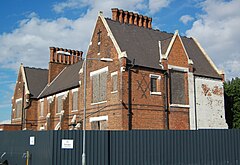Birmingham Union Workhouse
| Birmingham Union Workhouse | |
|---|---|

The surviving building in September 2013
|
|
| General information | |
| Type | Workhouse |
| Location | City Hospital |
| Town or city | Birmingham |
| Country | England |
| Coordinates | 52°29′19″N 1°55′46″W / 52.4886°N 1.9294°WCoordinates: 52°29′19″N 1°55′46″W / 52.4886°N 1.9294°W |
| Design and construction | |
| Architect | John Jones Bateman and G Drury |
The Birmingham Union Workhouse was a workhouse on Western Road in Birmingham, England. It was built between 1850 and 1852 under the Poor Law Amendment Act of 1834, to designs by John Jones Bateman and G Drury. The main entrance building, though derelict, is still extant. Its arched entrance was known as "the arch of tears". The remainder of the workhouse was demolished in the early 1990s.
In 1889 a hospital was built as an extension to the workhouse. This still exists, much developed, as City Hospital.
Despite its age and social significance, calls by the Victorian Society and Birmingham Conservation Trust, for the workhouse to be listed, were turned down by English Heritage in 2010.
The Birmingham Union Workhouse was constructed to increase the capacity of the pre-existing Birmingham Workhouse Infirmary, a workhouse constructed in 1734 on the site of the present day Coleridge Passage, now opposite Birmingham Children's Hospital. This previous institute had hosted the medical lectures of Mr John Tomlinson, the First Surgeon of the infirmary; these lectures, commencing in 1767 were the precursor to the foundation of the Birmingham Medical School in 1825 and were among the first formal medical lectures held outside London and Scotland.
...
Wikipedia
